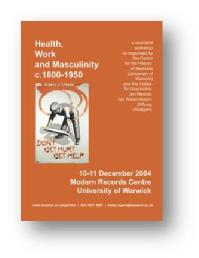Health, Work and Masculinity, c.1800-1950
Programme
Friday 10 December
Session 1: Masculinity, identity and work
Chair: Hilary Marland
Michael Meuser (Köln)
Masculinity, identity and work: Sociological considerations
Vicky Long (Warwick)
Healthy workers, healthy citizens: serving the nation through industrial welfare
Session 2: Men’s health and work: industries, conditions and health risks (part 1)
Chair: Hilary Marland
Martin Dinges (Stuttgart)
Men’s health and work: Some historical considerations
Tim Carter (Birmingham)
Kidderminstermen strike against Kidderminsterwomen: men, women and work in a Midlandswool town 1870-1914
Session 3: Men's health and work: industries, conditions and health risks (part 2)
Chair: Hilary Marland
Mark Bufton and Joseph Melling (Exeter)
Bargaining with the male body? Employers, workers and imagining the silicotic body in British compensation battles, c.1900-1945
Martin Lengweiler (Berlin)
Gendering of industrial risks: Conceptions and practices of male 'accident proneness', 1880-1920 (Switzerlandand Germany)
Saturday 11 December
Session 4: Experiences of illness and work
Chair: Mathew Thomson
Nicole Schweig (Stuttgart)
Corresponding about the body and illness: Are there any differences between workers and other men, 1800-1920?
Brooke Whitelaw (Warwick)
”The problem of square pegs”: industrial psychology and “maladjusted” industrial workers, 1914-1945
Session 5: Corrupting the working man: desease and stigma
Chair: Mathew Thomson
Jürgen Schmidt (Berlin)
’The workers are usually healthier…than the masters’: The experience of disease in German working class autobiographies
Joseph Melling and Pamela Dale (Exeter)
Dreadful Diseases: Communicating and Concealing the Occupational Health Hazards Faced by Spinners and Weavers in the British Textile Industries before 1959
Session 6: Health care and wounded bodies
Chair: Martin Dinges
Samisksha Sehrawat (Wellcome Unit for the History of Medicine, Oxford)
Hardy Peasants from Martial Castes: Sepoys and Health Care Provision by the British Army in Early Twentieth Century India
Manuel Richter (Max Planck Institute)
Embodying Manliness and Nation: The Everyday (Re-)Production of Male Identities in Family Correspondences of the Franco-Prussian War (1870/71)
Session 7: Loss of masculinity?: Out of the work force, invalidity and old age
Chair: Martin Dinges
Jonathan Reinarz (Birmingham)
Rage against the machine: The history of occupational health and the machinery question
Andreas Weigl (Bureau of Statistics, City of Vienna)
Morality and morbidity of old workers in late Habsburg Vienna
Discussion
Discussion leaders: Hilary Marland, Mathew Thomson and Martin Dinges

